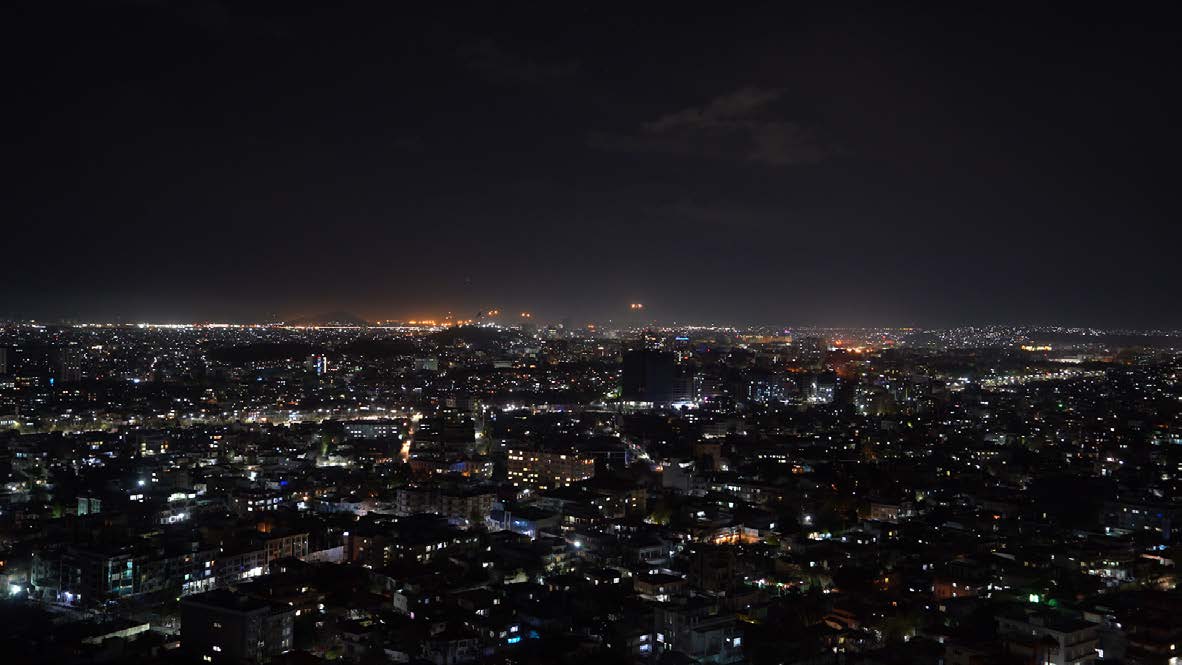Cape Town
7 October - 25 November 2023Aziz Hazara
Dialectics

Dialectics, 2023, video still
STEVENSON is pleased to present Dialectics by Aziz Hazara, the artist's first solo exhibition on the continent.
In 2021 Hazara received the 6th Future Generation Art Prize in recognition of his depiction of ‘complex independent ways of existence even amidst conflicts that seem never-ending’. For Dialectics, he demonstrates the choreography between social history, power relations and narrative for which he has received acclaim. Comprising video, installation and photography, the exhibition offers perspectives on the creation and collapse of systems through the stories of the people of Kabul, Afghanistan, dating between 1979 and 2021.
Dialectic, the film from which the title is drawn (2016–23), is shown across two channels. One features grainy footage of military operations and scenes from scripted news reports, closing with the figure of a child walking through a forest, all filtered through night-vision lenses. The other channel, featuring found footage in colour, amplifies this ambiguity with daytime scenes of improvised jest. Armed men are seen flying kites, milling about the marketplace, playing on swings hanging from miliary aircraft and riding boom-gates. In these contrasting viewpoints of the same terrain – primarily backed by the sound of leaves – the artist provides the audience with a glimpse into the everydayness of precarity and the persistence of childlike innocence. Across both facets of the work, the focus is on the movements, gestures and speech of individuals. Both civilians and military personnel are foregrounded to reflect how life in a conflict zone vibrates with the anticipation of catastrophe even in its absence.
Takbir (2022) is the most visually abstracted of Hazara’s films. Over its 10-minute duration, the artist places emphasis on sound as a translator of historical experience and its attendant anxieties. The work gets its title from the call 'Allāhu Akbar'(God is great), which appeared on the nation's flag until it was seized by the Taliban in 2021. This symbol of protest, prayer and solidarity is known to be repeated within Islam as well as by Arabic-speaking Buddhists, Christians and members of the Jewish faith. Historians have noted its prominence across Kabul during the Soviet occupation of Afghanistan in the 1980s, amid the revolutions of neighbouring states such as Iran in the early 2000s, and at other times of upheaval in the Middle East. Here, the Takbir is repeated as the camera pans over the nocturnal landscape of the city, spliced into other sounds of prayer to create a musical effect. Later, as the camera distorts individual lights into a uniform blur, the phrase is heard as if spoken by a chorus of all ages and genders, reflecting both a reality of confinement across generations as well as the irrepressible spirit of freedom.
Francesca Recchia, a researcher based in the city, has responded to Hazara's work noting, 'Kabul is not a city in a cage, this is a city that secretly hatches hope and the possibility of change. It is a city that is growing, aggressive and resilient, powerful in all the potentials that are yet to be revealed'. In Dialectics, the artist offers ways in which to understand these contradictions, articulating the everyday nature of transcendence and tragedy, taking place historically and into the future, for the people of Afghanistan as well as other embattled regions.
Aziz Hazara was born 1992 in Wardak, Afghanistan and lives in Berlin.
His solo exhibitions include No Starting Point for Revolution, Experimenter, Kolkata, India (2023); Condemnation, ICA Milano, Italy (2023); No Dress Code, PSM Berlin, Germany (2023); Chalk Drawings, Künstlerhaus Bethanien, Berlin, Germany (2022); It’s Only Sound That Remains, Smack Mellon, Brooklyn (2022); No End In Sight, Hessel Museum of Art, CCS Bard, New York, USA (2020).
Hazara has particiapated in notable group exhibitions including Is It Morning for You Yet?, the 58th Carnegie International, Pittsburgh, USA (2022); Penumbra Expanded, MAXXI, Rome (2022); Penumbra, Fondazione In Between Art Film, Ospedaletto & Church of Santa Maria dei Derelitti, Venice (2022); Words At An Exhibition: An Exhibition In Ten Chapters And Five Poems, Busan Biennale, South Korea, (2020) and NIRIN, 22nd Biennale of Sydney in Sydney, Australia (2020).
The exhibition opens Saturday 7 October, 10am to 1pm.

